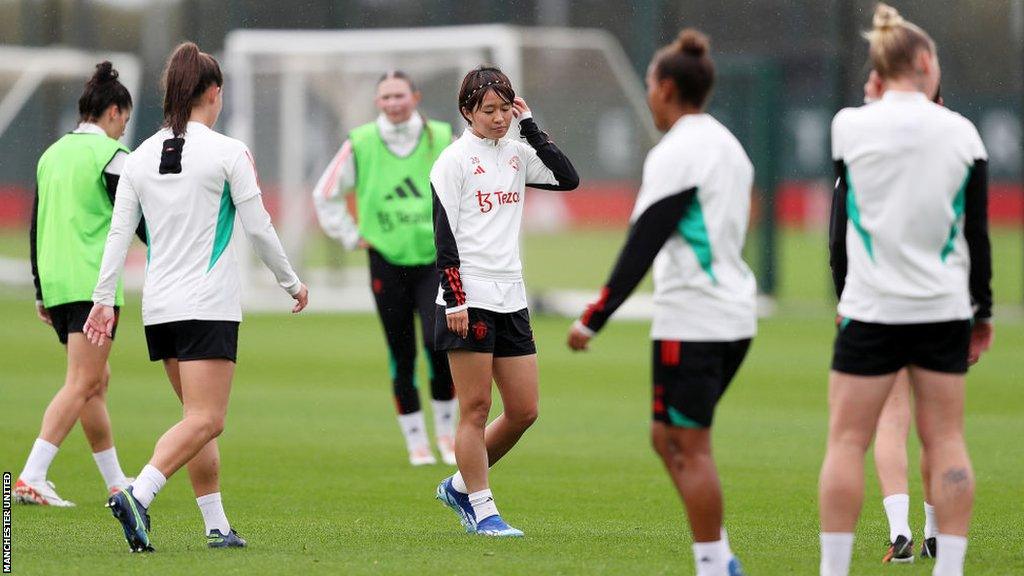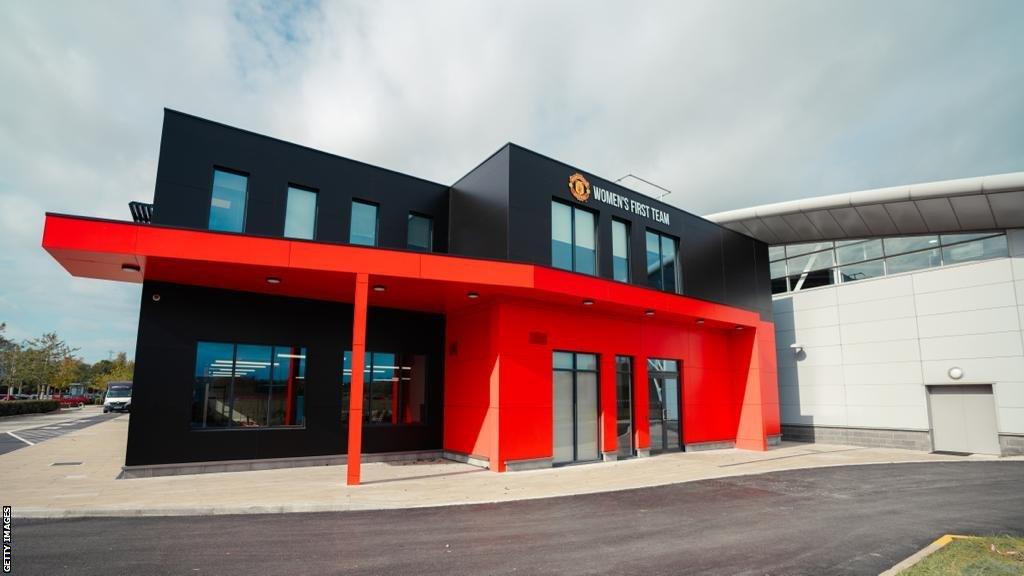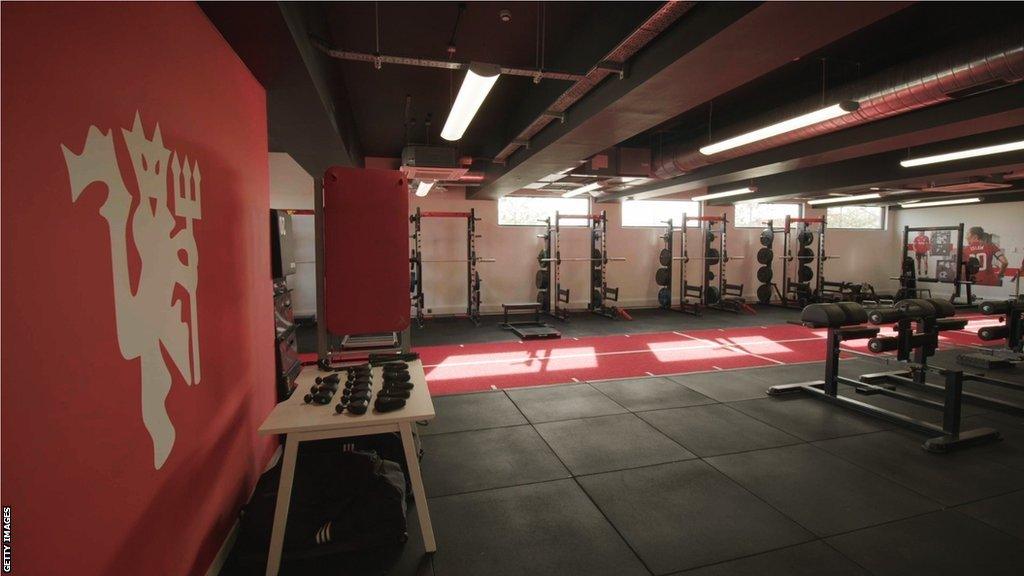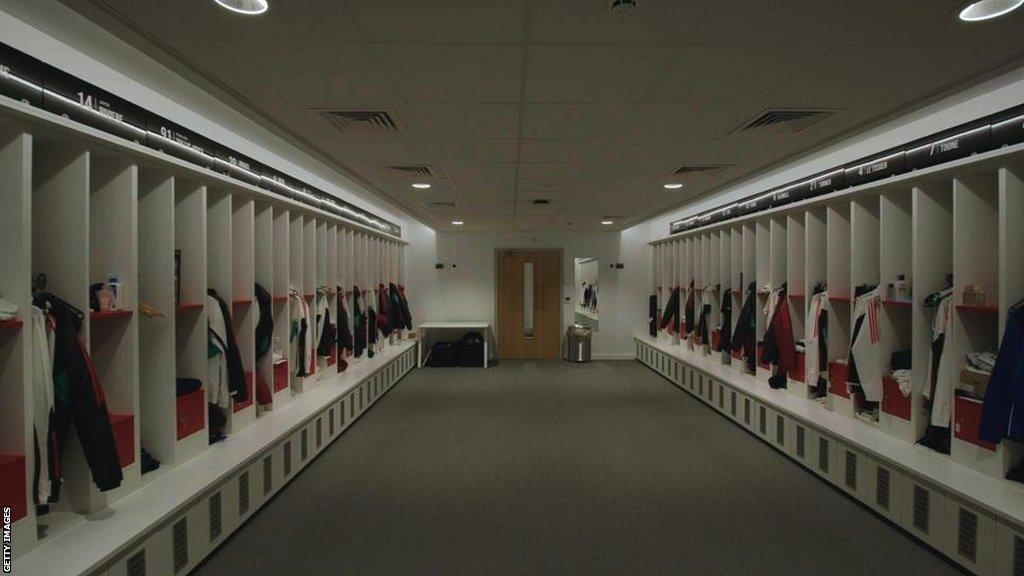Manchester United: Inside women's team's new £7m Carrington training facility
- Published

Manchester United are level at 1-1 going into their Champions League qualifier second leg against Paris St-Germain
On the pitch, it could be argued Manchester United's Champions League qualifier second leg at Paris St-Germain on Wednesday is the biggest game in the short history of their women's side.
Off the pitch, attention around United is diverted by the increasing likelihood of British businessman Sir Jim Ratcliffe becoming a minority shareholder and whether that might ultimately be the start of an exit from Old Trafford for the Glazer family, who are despised by so many supporters.
But almost unseen, despite the excellence of the actual structure, United have unveiled their new £7m women's training facility at their Carrington training ground.
The building includes gym and rehabilitation areas, changing rooms, kit and boot rooms, a women's first-team restaurant complete with a live cooking area, analysis and meeting rooms and a players' lounge.
United believe it has the potential to make more of an impact than any single game - no matter how big - and also provides proof that development work at the club has continued despite the 'strategic review' launched by the Glazer family in November which may, finally, be reaching a conclusion.
"We are doing this [strategic review] for a very positive reason," United's chief operating officer Collette Roche told BBC Sport.
"We have real ambition and a plan at United. We want to make sure we attract the right investment to deliver that ambition.
"We are not standing still in the meantime. Whilst that is in the background, we are obviously continuing to invest in players on the pitch and facilities on it. That is what you can see with this facility."
It was claimed one of the reasons for Casey Stoney's decision to quit as United boss in 2021 was the inadequate facilities her side were given to train in.
Thankfully, the temporary buildings players were getting changed in and the marquee being used as a makeshift gym have gone. The facility is modern - and provides something akin to the male team, who train in another area of the same site.
"The women's team is something we take really seriously at Manchester United," said Roche. "That is why we have backed this facility and we are all behind making sure our women's team is a success."
The current structure of the Women's Champions League, where only five qualifiers from the non-champions path reach the last 16, compared with seven from the champions path, and only four clubs qualify directly, works against teams from the bigger leagues who did not win their respective titles.
In addition, as United have no previous history of qualifying for European tournaments, they had no co-efficient ranking and ended up being placed alongside Dutch side FC Twente and Norway's Valerenga in the non-seeded pot, which is how they ended up being paired with PSG, who reached the quarter-finals last season and the semis in three successive years before that.

Manchester United women's new £7m training facility
It means after claiming a creditable 1-1 draw in the first leg at Leigh Sports Village, Marc Skinner's side face an immensely difficult task at Parc de Princes on Wednesday in order to reach the group stage.
"Yes, the Champions League is an unforgiving competition but you want to be playing against the best, week in, week out," said United's head of women's football Polly Bancroft.
"The fact is we need to be beating teams like PSG in this competition anyway. The strength of the opponent doesn't faze us.
"England isn't the only country that is investing in women's football, but now we have created a fantastic environment for players and staff to continue building.
"Obviously standards are getting higher, so this gives us a competitive advantage, domestically and internationally.
"We don't want this European campaign to be a flash in the pan. We want to be playing in Europe regularly. This is a new experience for us and we hope there are many more to come."

The new training facility includes a gym and rehabilitation areas

The changing room at Manchester United women's new training facility
DNA's role in reconnecting families: Stacey Dooley meets people across the UK to help unlock mysteries hidden within their genetic code
Exploring Ireland's complex history: Fergal Keane charts the history of Ireland and her people from the earliest days to the present
